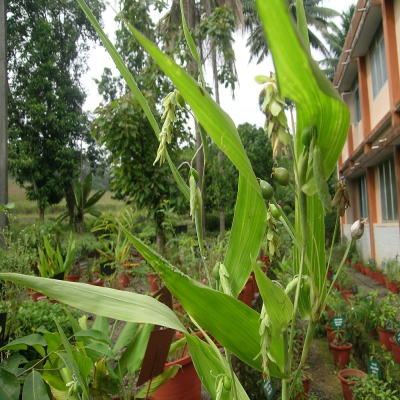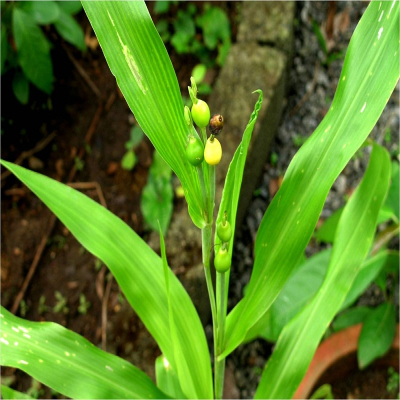Coix lacryma-jobi Linn.
Synonyms : Coix lacryma Linn. , Coix lacryma Linn.
Family : Poaceae
Parts Used : Root , Seed
Vernacular Names :-
| English | : | Job’s tears |
| Malayalam | : | Kakkappalunku |
| Hindi | : | Guru samkru |
| Sanskrit | : | Gavedhukah |
| Bengali | : | Sanku,Gur gur |
| Gujarathi | : | Kasai |
| Kannada | : | Kolti-baeja |
| Tamil | : | Kattumani |
Distribution and habitat: Throughout India
Botany: An erect perennial grass upto 1.5 m high with basal rooting node, internodes smooth, polished.
- Leaves: Narrowed from a broad cordate base to an acuminate tip, smooth on both surfaces, with slender nerves and spinulosely serrate margins; midrib stout; sheaths long, smooth; ligule a very narrow membrane.
- Inflorescence: Racemes nodding or drooping from long peduncles; rachis within the bract slender, above the bract stout, notched at the nodes. Male spikelets 10 - 13 mm long, subsequent, imbricating. Lower involucral glume 10 mm long, elliptic lanceolate, acute, concave, many nerved. upper involucral glume similar to the lower but not winged, 5-9 nerved; lower floral glume oblong-lanceolate, hyaline, paleate, triandrous, 3-5 nerved; upper floral glume similar, paleate, triandrous or empty. Anthers 5 mm long, orange.
- Fruit: Subglobose or ellipsoid, bluish grey, 6-10 mm long, smooth, polished.
Properties: Diuretic, cathartic, depurative
Chemical constituent: Leucine, tyrosine, histidine, lysine, arginine and coicin.
Uses: Strangury, pneumonia, diet drinks for invalids and pectoral diseases
Propagation: Seed


